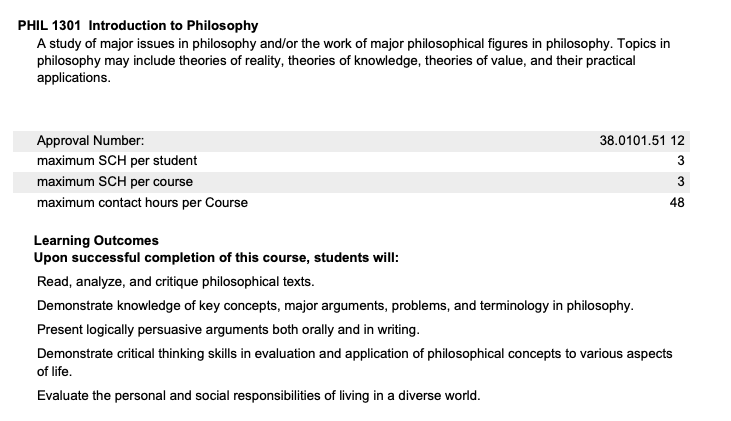This is the third and final installment of “How I learned to love HB2223.” You can think of the series as a sandwich: data between two mandates.
And speaking of money, let’s turn to reimbursement. You probably know that, for each course enrollment, ACC is entitled to a reimbursement from the state — but there are conditions. In academic transfer areas, for instance, courses are not eligible for reimbursement unless we play by the state’s rules. If you look up your favorite course in the Academic Course Guide Manual, you’ll find an entry that looks like this:

This entry tells you some interesting things about intro to philosophy as the state sees it: the course description, learning outcomes, and even the maximum amount of time you can spend with a student doing intro-to-philosophy things. The approval number means the state will pay a reimbursement, but have a closer look at the next two lines. There are caps of 3 SCH per student and 3 SCH per course. In a nutshell, the state is telling us that we don’t get reimbursement for more than 3 credit hours for intro to philosophy. (I’m glossing over some nuances here, like what happens when a student repeats a course because of what we politely call “nonmastery.”)
The lesson in looking at the ACGM is that the state tells us how much they will reimburse — the rate and the number of credit hours— and that’s where the second mandate in HB2223 comes in. In the Good Old Days before the 85th legislative session, Texas reimbursed institutions for a maximum of 18 credit hours for dev ed, and in HB2223, the maximum is reduced to 12. Yes, you read that right: 12. Students have been known to burn through 12 credits just trying to master college math.
The downside of this change is obvious: We now have fewer credit hours in which to equip students for college and get reimbursed for it. This doesn’t mean that we can’t go beyond the 12, any more than the intro to philosophy profile caps what we do. We could decide that an adequate intro to philosophy takes 6 or even 9 credits (and in an ideal world, we would). But we won’t be reimbursed for more than the maximum, so we’d be on the hook for the balance.
It’s not pleasant to think this way, but we’re actually between the Scylla of helping students succeed and the Charibdis of getting paid for it. What options are there?
Well, we could become a selective-admission institution, which stacks the deck in our favor for reimbursement. If you gasped at that sentence (and you probably should), then you don’t need to be told why this is a problem: It’s inconsistent with our raison d’être, our mission, and our values at ACC. Plus there’s the expense of renaming ACC to leave out the word community.
We could ask our public school partners to please, please prepare every kid for college. We could even try “pretty please.” But whatever you may think of what’s happening (or not) in public school, one thing seems clear to me: If teachers could prepare every kid for college under the conditions in which they have to work, they would. Our situation isn’t the result of an ISD faculty committee voting to underprepare kids. The situation is much more complex, which, of course, makes it much harder to find someone to blame. (Incidentally, this inverse relationship between complexity and finding someone to blame is why the venerable Straw Man Fallacy is still so popular.)
We could stick to traditional approaches and keep students in however many credit hours it takes. We could also assign every new ACC student a tutor, massage therapist, and life coach. I’m fairly confident that would boost success, too, but I’m going to go out on a limb now and say that approach is probably not scalable or sustainable.
The only other viable option is this: We have to get better at equipping students to meet the challenges of college work. We have to find ways to help students succeed, as far as we can and as often as we can. To do that, we’re going to have to think differently and leverage everything we know about learning and skill-acquisition, like contextualized learning.
I hate to sound pessimistic, but here’s the bottom line: We’re primates, and, throughout our history, we primates are known for things like opposable thumbs and language and primary urbanization and writing — but not for being proactive. Typically, we have risen only to challenge, and the more existential the challenge the higher we rise, species-wise. I don’t see that changing any time soon, and that brings me back to love.
The one thing Mandate II will do for us is create a threat, and—painful as it may be—threat is actually good for us. We won’t have the luxury of luxury in our teaching practices, and that may well turn out to be a very good thing for student success.
And that, friends, is how I learned to love HB2223.
